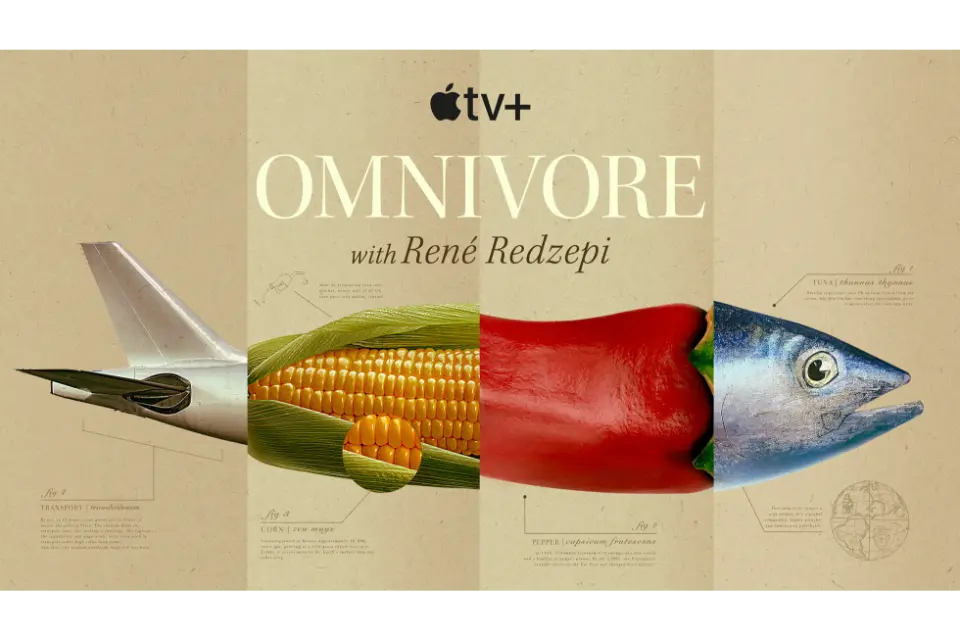
Brian Kennett
Amateur Chef and Boozy Traveling Foodie Extraordinaire
Omnivore Review Apple TV: Chef Rene Redzepi takes to screen for this most wonderful of food shows of all time
Omnivore Review Apple TV+: A Feast for the Eyes and Mind, narrated by Noma’s infamous Chef Rene Redzepi
Apple TV’s food series Omnivore is not your average cooking show, oh no. It goes far beyond presenting recipes or cooking techniques. Chef Rene Redzepi comes out from behind the jump to liaise with the Apple TV crew and explore the cultural, historical, and environmental significance of the food we eat across eight Omnivore Apple TV Episodes: 1/ Chile, 2/ Tuna, 3/ Salt, 4/ Banana, 5/ Pig, 6/ Rice, 7/ Coffee, and 8/ Corn.
It is so very insightful, informative and visually stunning – like the most incredible cinematography you have ever seen for a food show, in fact, any show. Omnivore offers an incredibly immersive exploration of the global food chain, providing insight into the intricate relationships between food, people, and the planet.
I think back to the scene of a banana farmer’s (Abaneesh Sahadevan Nair) son, reflecting on his life as they punted a boat, loaded with bananas, down a river in Kerala, India. I felt like I was sitting next to him having a conversation. What an experience this show brought me.
Rene said, of the farmer and his son: “They dedicate their lives to the production of food … without the primary motive of wealth creation.” Yes, folks, this is more than a cooking show.
So good was this show that the crew at Islifearecipe felt compelled to write this Omnivore Apple TV Review about this piece of food TV legendary viewing. This is the first-ever for Islifearecipe. I’d just come off the back of watching Noodles on another streaming channel, and was thinking: “It doesn’t get much better than that…” Oh boy, was I wrong?
This show stands up there with the best of the best that I have ever seen on TV, even when compared to the likes of National Geographic airing our splendid planet and its wide variety of inhabitants. It is seriously EXCEPTIONAL, and it’s about food so that is a double hard-on for me!!! This is simply some must-watch TV, please, I beg you… watch it, and tell me what you think of it.
Chef Rene Redzepi said.. His very own Omnivore Review
“But in terms of food, where it comes from, what’s the season, who’s behind them, and what’s the impact? We have no clue anymore. And that is a great shame.
“We are hoping that the (show) will ignite curiosity for people that watch it, like, ‘Wow, I can’t believe that coffee is such a magical thing’.”
“I truly believe food is the most important thing on Earth and we should all discover that because it would make us healthier and it would make the planet healthier if we start eating better,” Redzepi said.
“It is very simple to say these words and, of course, there are many great challenges in it, but if you at least realise that you should pay more attention and care for what you eat, that’s a step forward in the right direction.”
Omnivore Apple TV Trailer: stunning, simply stunning
Apple TV Omnivore Review: Table of Contents
All pictures used in this Omnivore Review blog are courtesy of Apple TV
The Concept of Apple TV's Omnivore: A Holistic Approach to Food
At the heart of Omnivore Documentary is its broad, overview of food. Rather than focusing solely on chefs or specific dishes, the series takes an end-to-end approach, looking at food production, sustainability, and consumption patterns across different regions of the world, focused on those eight stables.
The show is aptly named, reminding us that we humans, as omnivores, have a unique place in the ecosystem with a vast and varied diet. Each eating choice we make about what to eat carries profound impacts, but do we give a sh!t?
Each episode of the Omnivore Documentary is focused on a particular ingredient, food group, or theme. The show deep-dives into how foods are grown, harvested, and processed. It features interviews with local farmers, food artisans, environmentalists, historians, and chefs, all sharing their knowledge and perspective on the subject at hand: sheer brilliance.
The depth of research is shown from start to finish, and the storytelling weaves these elements together to show the multifaceted nature of food in our world. I’ll say it again: sheer food TV documentary brilliance. I have written to Apple to ask that they choose another eight ingredients and kick-off series two.
Apple TV Omnivore Review: The Danish Chilli 'moment' on Apple TV
In the episode titled, “Chile” (no not the country), Chef Rene Redzepi is holding his staff pre-service briefing. He explains that they’ll be serving the hottest Danish Chile to their guests tonight, the Copenhagen Bhut. But how can he serve it to their guests if they have not tried it themselves… Of course, all his crew lean in and devour a whole Bhut each.
Guests at Noma are then shown being given the choice to eat a mild pepper or a super-hot “Copenhagen Bhut” pepper with the server saying “Choose your weapon”.
What unfolds is some of the very best food TV I have ever watched in my life, as you witness the impact on the staff and guests of this super-hot chilli in a sort of transcendental perspective. It is just genius, and I watched it about five times. I hope our Omnivore Review does this sublime show justice.

Stunning Visuals for Apple TV's Omnivore: A Feast for the Eyes
One of the most striking aspects of Omnivore is its cinematography. The visuals are nothing short of breathtaking, capturing everything from sprawling farmlands and bustling markets to intimate close-ups of ingredients being prepped and cooked. The attention to detail in the filming makes even the most ordinary ingredients—like grains of rice or a simple loaf of bread—look spectacular.
It’s clear that the creators of Omnivore understand that food is not just sustenance; it’s TV art. It’s #foodporn. I am addicted and I need more.
Each episode is a journey around the world to get a 360 perspective, as the show’s creators take us to remote locations, showcasing diverse landscapes and food traditions. One minute you might be watching fishermen haul in their catch in the Arctic Circle, and the next, you’re witnessing a bustling street food market in Bangkok. This global perspective highlights the sheer diversity of food cultures, while sharing the commonalities that unite this planet through our food choices.
The series doesn’t just stick to high-end culinary traditions either. Omnivore celebrates street food, family meals, local artisans that break the corporate ‘rules’, and the everyday food experiences that are often overlooked by ‘other’ glossy food and travel shows. The production team’s choice to focus on both the extraordinary and the humble makes this quite a unique viewing experience.
The Human Element: Stories Behind the Food in Apple TV Omnivore
What makes Omnivore truly engaging is its focus on the human stories behind the food: you get to ‘know’ the people behind the stories, in only 45 minutes. At times I felt like a friend, or a family member as they shared their personal experiences. Immersive, engaging and downright addictive is what it is.
The series doesn’t just show you how food is grown or cooked, no, it introduces you to the people who dedicate their lives to producing it. Farmers, fishermen, chefs, and food artisans all share their personal stories, giving us a glimpse into the dedication, passion, and challenges that come with their work: whilst we sit in a resto chowing down on a taco, with rice and a coffee – with no onward consideration of where that rice, coffee bean, or corn came from…
These hyper-personalised narratives add such a deep emotional lens to the series, reminding us that food isn’t just a product to be consumed; it’s the result of hard work, history and tradition, care, and people. Whether it’s a family-run farm in Italy that’s been passed down for generations or a street vendor in Mexico perfecting a recipe over decades, these stories bring a human connection to the food on our plates. Think about it, folks…
Apple TV Omnivore Review: Eight Glorious Episodes
Apple TV’s Omnivore episode titled “Pig” gets into the complex relationship between us humans and one of the world’s most consumed animals: the pig (yummo). The episode doesn’t shy away from addressing the ethical, environmental, and cultural aspects of pig farming and consumption.
From small, sustainable farms that focus on humane practices to industrial pig farming, the episode explores both ends of the spectrum. Expert chefs, farmers, and environmentalists weigh in on pork‘s impact on our food system, making it both educational and seriously thought-provoking (still I could never give up bacon or Jamon… sorry piggy).
It also gives an in-depth look at the cultural significance of pork across different regions. The episode highlights traditional dishes and culinary techniques, from crispy roast pork in Asia to artisanal charcuterie in Europe. At the same time, it raises important questions about sustainability and ethical eating, using stunning cinematography and deeply engaging storytelling. “Pig” leaves you with a deeper understanding of the piggy on your plate and the far-reaching consequences of your choices. Oh dear…
To close I found some rather interesting facts in this episode. For example, have you ever wondered why there are so many pork dishes in Spanish cuisine? Remember the Spanish Inquisition? Basically, Muslim and Jews, convert to Catholicism or face a very brutal death if you don’t. How to prove that those who said they had converted, truly had? Well, guess what both Muslims and Jews do not eat as part of their religion… go figure…
OK, one more close. If you watch the show you’ll know what I mean when I say: “I love you Anton…Good luck with the raffle outcome.”
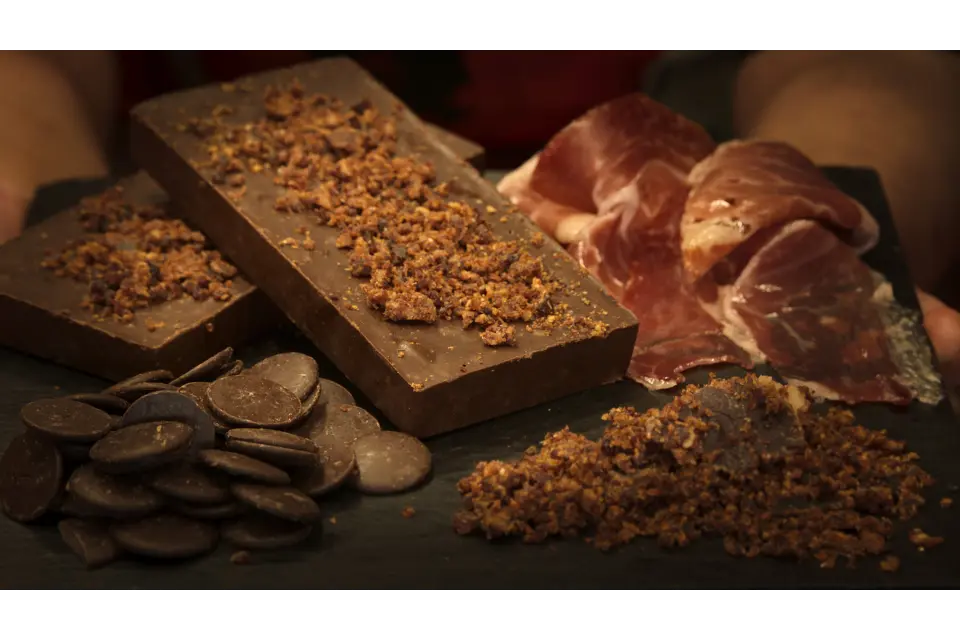
Omnivore on Apple TV: Salt
“Salt” takes us on a fascinating journey through the history, major significance, and science (yes food science) behind one of the most essential ingredients in the world (and personal favourite). It explores how salt has shaped civilizations, from ancient trade routes to modern kitchens, making it much more than just a seasoning.
You get introduced to various salt harvesting techniques, from traditional salt pans, and Incan stepped mountains, to modern mining methods, showcasing the ingredient’s profound impact on global food systems. Again, this episode comes with beautiful and stunning cinematography, capturing stunning salt landscapes across the world.
What truly elevates this episode is its exploration of the cultural diversity around salt. The show features chefs, historians, and food artisans who explain how salt is not only a flavour enhancer but also a crucial ingredient in preserving foods and elevating traditional dishes. This episode includes Chef Rene salt-baking a chicken and Turbot in Noma and his home kitchen: I now have new recipes to try.
From handcrafted sea salt in Japan to Himalayan pink salt, the episode celebrates the uniqueness of salt in every corner of the globe. The “Salt” episode is my second favourite after Chile. It’s just a WOW on my foodie barometer.
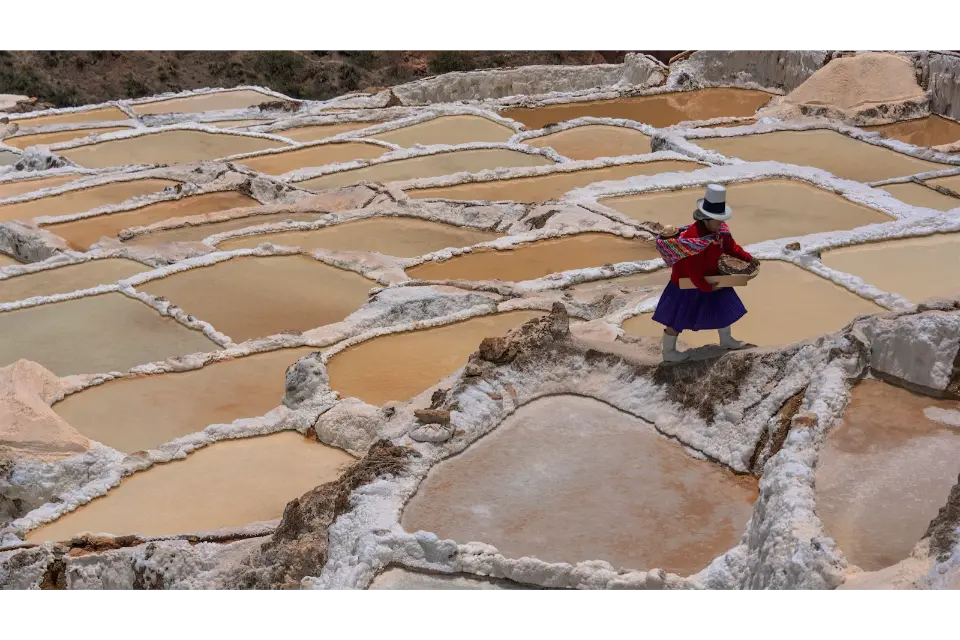
Apple TV’s Omnivore episode titled “Chile” is my absolute favourite. It takes you on an exhilarating exploration of one of the most fiery, savoury and beloved ingredients in global cuisine. You get taken through the fascinating history of chilli peppers, from their origins in the Americas to their widespread influence across Asian, African, and European cooking.
Through interviews with farmers, chefs, and historians, the episode showcases the wide variety of chilli peppers, from the mild and sweet to the incredibly spicy. It explores how this small, potent fruit has not only shaped food culture but has also become a symbol of bold, vibrant flavours across the world.
The visit to Thailand with the Michelin Chef and his Wife is seriously funny. Plus, did you know that the ‘humble’ Tabasco Sauce is fermented for THREE YEARS in oak barrels before it hits your pizza or pasta…? Also, I fell in love with the section on Paprika farming. Goodness me. Amazing.
In addition to its historical and cultural significance, the “Chile” episode gets right into the science behind the heat. You learn about capsaicin, the compound responsible for chile’s spiciness, and how it interacts with the body to create that signature fiery sensation. It also explores the role of chilli peppers in health – yep health, from potential pain-relieving properties to their ability to boost metabolism: funnily enough I always sh!t myself very fast after a chilli hot spicy dish.
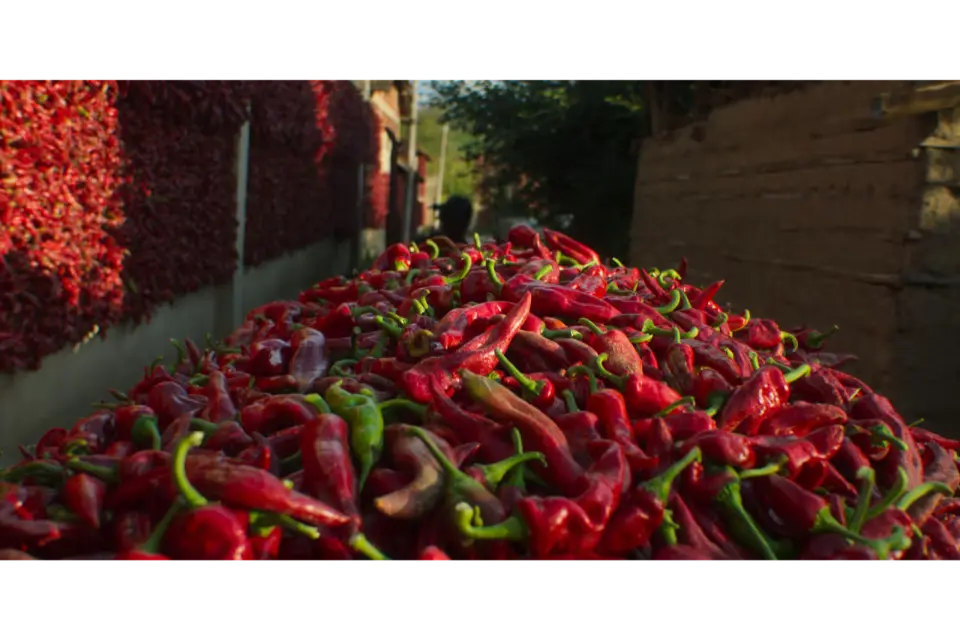
Omnivore Review Rene Redzepi: Banana
“Banana” peels back the layers (you like that?) on the world’s most widely consumed fruit, going deep into the cultural, economic, and environmental significance of bananas: this is a fruit that caused military coups. You roam from tropical plantations in Latin America to more artisanal in India, exploring the banana’s evolution from a wild fruit to a global dietary staple.
Through interviews with farmers, historians, and even scientists, the episode reveals the behind-the-scenes story of banana cultivation, including the challenges posed by monoculture farming and diseases that threaten this essential crop: one is happening right now. The show also emphasizes how bananas have shaped food traditions, appearing in everything from street snacks to gourmet desserts.
This episode highlights innovative farming techniques and the development of new banana varieties that aim to ensure sustainability and protect biodiversity: the Indian banana King and his son is a must-pay-attention segment. The episode also showcases a variety of banana-based dishes from around the world, demonstrating the fruit’s versatility in both sweet and savoury cooking: did you know there are over 1,500 varieties of banana? Me neither…
Thought-provoking commentary, seriously interesting banana history, and just the most wonderful cinematography make this episode a must-watch for anyone interested in how this humble fruit has shaped the modern world. I did not think I was going to dig this episode, more fool me.
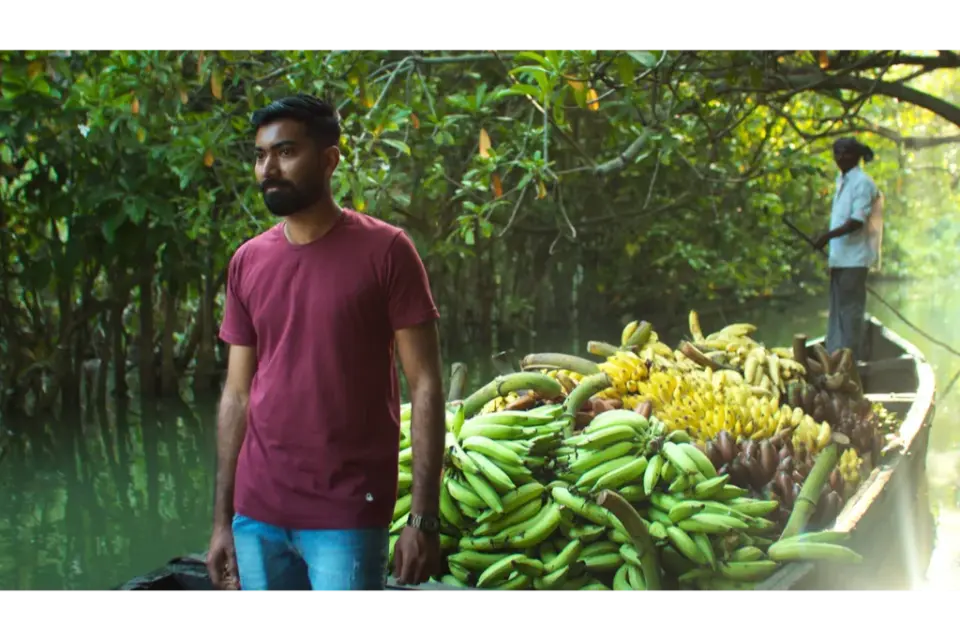
“Rice” takes us viewers on an enlightening journey through the history, cultural importance, and global impact of one of, if not the world’s most essential crop. The episode begins by tracing rice’s ancient origins in Asia and follows its spread across continents, becoming a staple food for billions on our planet.
They get down and do interviews with rice farmers, chefs, and food historians, to show how rice is more than just a ‘grain’, and that it’s actually a cultural symbol deeply tied to rituals, traditions, and community. You get to see the diverse ways rice is cultivated, from flooded paddies in Southeast Asia to innovative methods in South America, showcasing the labour and dedication required to produce this everyday ingredient: I was able to think back to the stunning elevated and tiered paddy fields in the Philippines and Bali, with Carabao (AKA Filipino Tractor) meticulously ploughing the fields with partner: the farmer.
The episode leans into the impact of climate change on rice farming, the importance of sustainable practices, and the efforts being made to develop resilient rice varieties that can thrive in the changing conditions that we humans are causing. The show beautifully captures the versatility of rice in global cuisine, featuring iconic dishes like Japanese sushi, Spanish paella, and biryani, while emphasising the social and cultural significance behind them. It is a beautiful beautiful piece of TV.
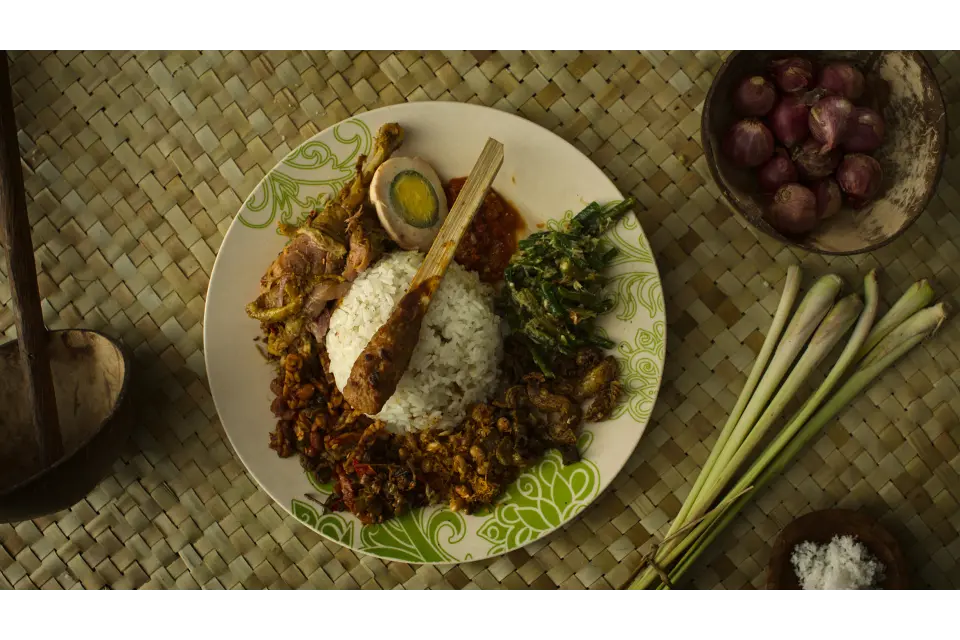
Coffee: Rene Redzepi and Apple TV Omnivore
“Coffee” focuses on the world’s favourite caffeinated beverage, exploring its rich history, cultural significance, and rather complex production process. From the high-altitude coffee farms of Ethiopia to the bustling coffee shops of Europe, the episode traces the journey of coffee beans from plant to cup.
Like the other episodes, there are interviews with coffee farmers, roasters, and baristas giving us a comprehensive look at how different regions cultivate unique flavors and how the global demand for coffee has shaped economies, literally.
The episode also highlights the traditional brewing methods and rituals associated with coffee in different cultures, from the meticulous pour-over technique to the strong, bold flavours of Turkish coffee.
What sets the “Coffee” episode apart is its focus on the sustainability challenges facing the coffee industry today. The show examines the environmental impact of large-scale coffee production and how climate change threatens the future of coffee farming. It also features innovative approaches being developed to create more sustainable and fair-trade coffee practices.
Again, it is beautifully shot with stunning visuals of coffee plantations, bustling cafés, and expertly crafted espresso shots, this episode provides a deep appreciation for the work behind every cup of coffee. Omnivore‘s “Coffee” episode is a must-watch for anyone who loves coffee and wants to understand the broader impact of their daily brew.
My key takeaway was the Rwandan coffee and that ~30 people touch that bean before it ends up in your coffee up somewhere in the world. Those first hands are picking those bright red cherries (yes folks, coffee is a fruit – did you know that?) from the coffee trees in the mountains of Rwanda. They only pick the red ones to ensure consistency in the bean to the cup, many layers of the process later. A machine, however, will strip a tree of cherries be they red, green, or yellow, hence creating an inconsistent cuppa. Go Rwanda, you got my vote!!!
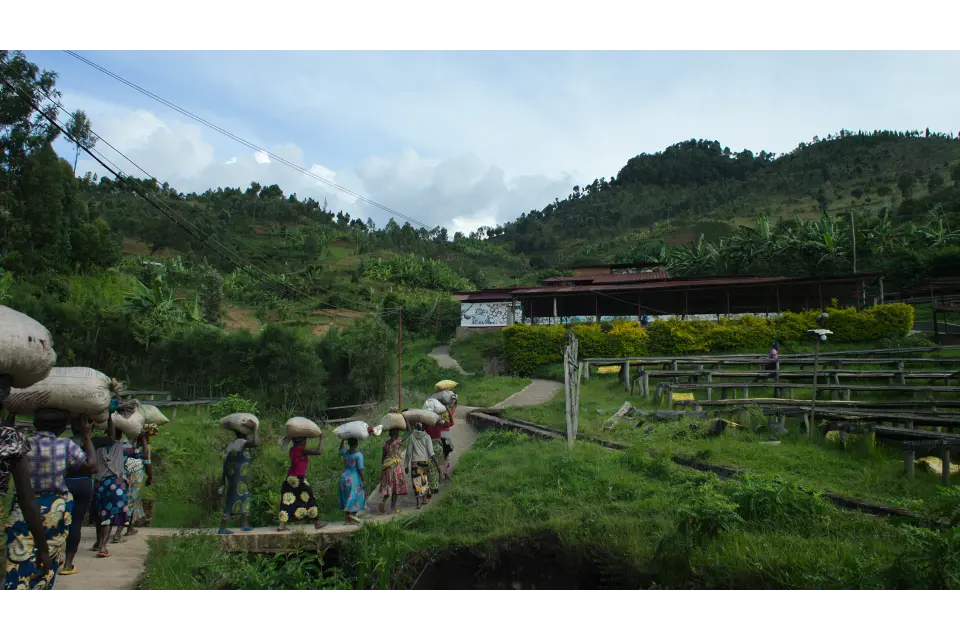
“Tuna“ was an absolute belter, and I hate fish haha, with a thorough exploration of one of the ocean’s most sought-after and controversial fish. The episode dives (oh the puns run thick and fast) into the global demand for Bluefin Tuna, from its role in sushi culture to its status as a staple in canned goods. Through totally captivating storytelling, you get introduced to the world of Bluefin Tuna fishing, showcasing the vast, open seas where fishermen work tirelessly to bring in these valuable fish.
“Tuna” also highlights the cultural importance of tuna in countries like Japan, where tuna auctions and sushi craftsmanship are taken very seriously, like a religion – just a fishy one. Alongside its cooking appeal, the episode brings attention to the overfishing of Bluefin Tuna and its significant impact on marine ecosystems, with very famous Chefs commenting on how sparse the markets are, and how much the product has increased in price.
What stood out for me during the “Tuna” episode was the blatant focus on sustainability and the future of Bluefin Tuna. I nearly said industry then, but sadly it could be the fish itself that is at risk. The show looks at responsible fishing techniques and the growing trend of tuna farming, aimed at reducing the strain on wild populations.
The show does present a very balanced view, showing both the importance of tuna in the global food scene, heck it is just so damned delicious, whilst representing the urgent need for conservation efforts to protect this species for future generations. It has stunning underwater footage, side-by-sides with fishermen, and thought-provoking interviews: it really is some beautiful TV.
To close, I am so stealing the half Bluefin Tuna Asador BBQ cage design that you’ll see at the end of the show. Olive oil, sea salt, cracked black pepper, rosemary: clip in and BBQ slowly over woodfire, Asador-style: WOOF!!!
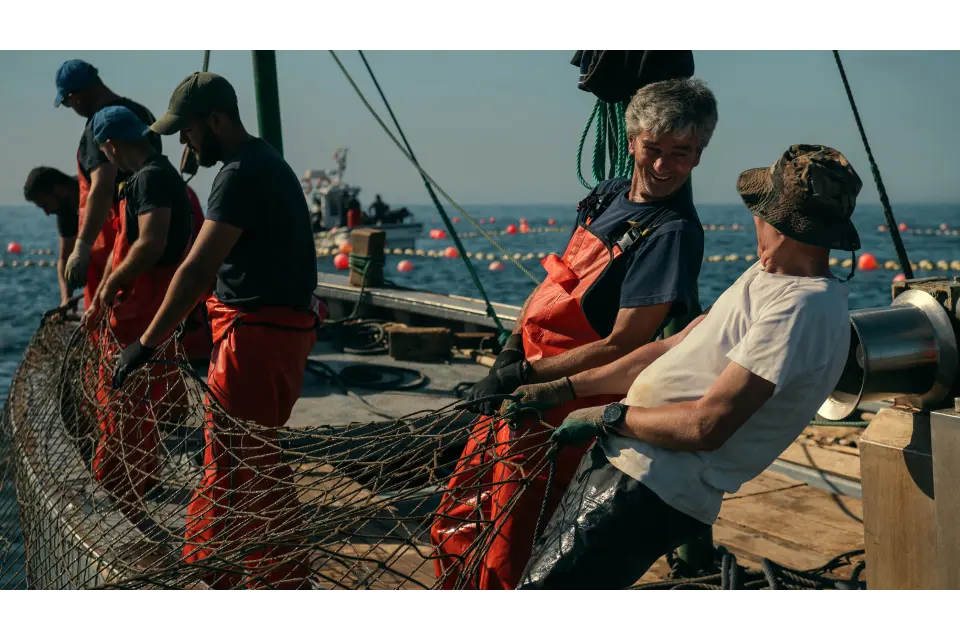
Omnivore Apple TV Review: Corn
“Corn” episode is special, explaining just how madly important one of the world’s most versatile crops is to us all on planet Earth. It goes into the deep roots (I promise this is likely the last food pun) of corn cultivation, from its origins in Mesoamerica to its transformation into a global staple: corn is used in just so so many things, not just cooking: it is insane.
As usual, they get to the farmers and historians, and we get to learn about the many varieties of corn and its vital role in the diets of various cultures, from Mexican tortillas to Southern cornbread. The episode also highlights how corn has literally shaped agriculture, becoming a foundation for numerous food/non-food products, from snacks to syrups.
The show probes deep, and even sheds light on the complexities of modern agriculture, including the use of genetically modified corn (scary), monoculture farming, and the strain it places on our ecosystems, especially when nature reacts. But again the show bounces back into equilibrium, as it also celebrates the movement towards heirloom corn varieties and sustainable farming practices that are reviving traditional ways of growing this crop.
Did you know that corn is the most-grown crop on the planet, with 1.1 billion tonnes grown globally every year? Most of that is grown in the good ole USA: if you put all the USA corn fields together it would be the same size as Germany. Now, that’s a lot of corn… But, only 10% of that corn from the USA is grown for food, because corn is literally in everything, from toothpaste to ethanol. It is truly an incredible vegetable.
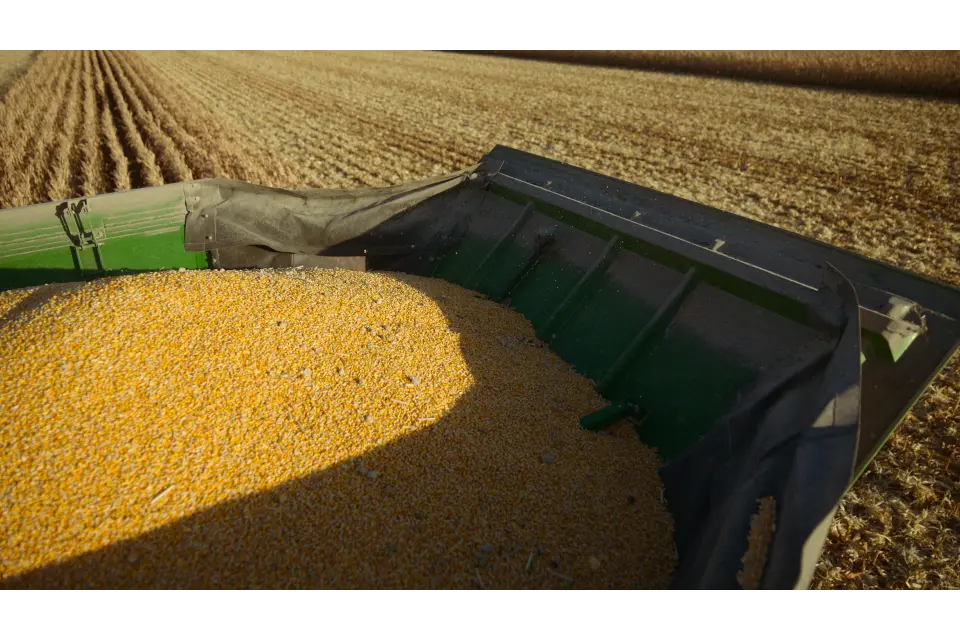
Cultural and Historical Significance on Apple TV's Omnivore
One of Omnivore‘s truly wonderful achievements throughout the show that we want to highlight in this Omnivore Apple TV Review is its ability to highlight the cultural and historical context of the food we eat. Each episode does a masterful job of showing how food is interwoven with history, politics, and society. For example, in one episode focusing on rice, viewers are taken on a journey through Asia, where rice has been cultivated for thousands of years. The episode dives into the role of rice in shaping entire civilizations, from ancient China to modern Japan, and its continued importance in the global economy today.
Another standout episode looks at the global trade of spices, shedding light on how something as seemingly simple as a peppercorn has shaped world history. The show explores the Spice Routes, colonialism, and the ongoing geopolitical conflicts over the control of natural resources. It’s fascinating insights into how our food systems have evolved and the often dark history that has influenced what’s on our plates today: but also suggesting the need to ‘go-back’: in one episode they even talk about crop-rotation ( learnt that in school, some 40 years ago now).
Yet, Omnivore doesn’t get bogged down in history for history’s sake, it really does not feel like the show is doing it for the sake of viewer eyeballs. It skillfully relates the past to the present and back again, showing how modern food systems are still shaped by these historical forces. By doing this, as a viewer you are encouraged to think critically about your own food choices and how they fit into larger global patterns. It surely makes you think, as you eat.
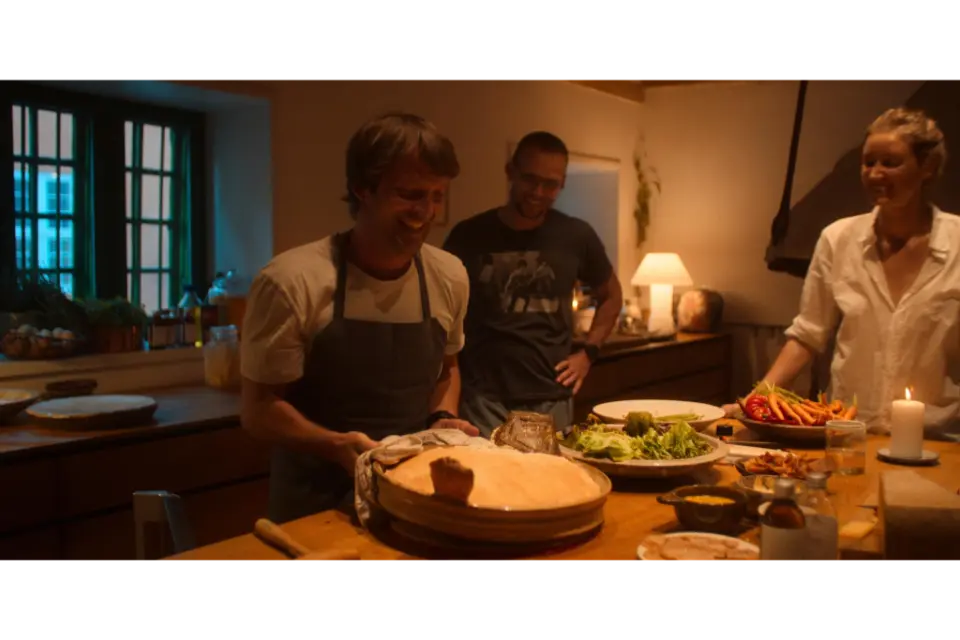
Sustainability and Ethical Eating: Omnivore Apple TV Review
A major theme running through Omnivore is the question of sustainability and ethical eating. In today’s world, where climate change and environmental degradation are becoming ever more pressing issues (just watch the “Rice” episode to realise this impact on the organic farmers), the series asks hard questions about how we can feed a growing global population without destroying the planet. It doesn’t offer easy answers but instead presents the complexities of the food industry and the delicate balance between production and conservation.
“Pig” explores the meat industry, for example, looking at the environmental toll of factory farming while also presenting alternative models. Chef Rene even states, “Killing an animal is not nice, and so out of respect for the animal we should eat…EVERYTHING.” Bravo Chef, as a firm believer in nose-to-tail, I really dig what the Chef is stating. The series presents multiple perspectives, allowing us to draw our conclusions while encouraging thoughtful dialogue on how our food systems need to evolve.
The show doesn’t take a preachy or one-sided approach. Instead, it highlights the challenges faced by small-scale farmers, large agricultural companies, and consumers alike. It acknowledges that there are no perfect solutions, but also stresses the importance of making more informed and responsible food choices and making them NOW!!!
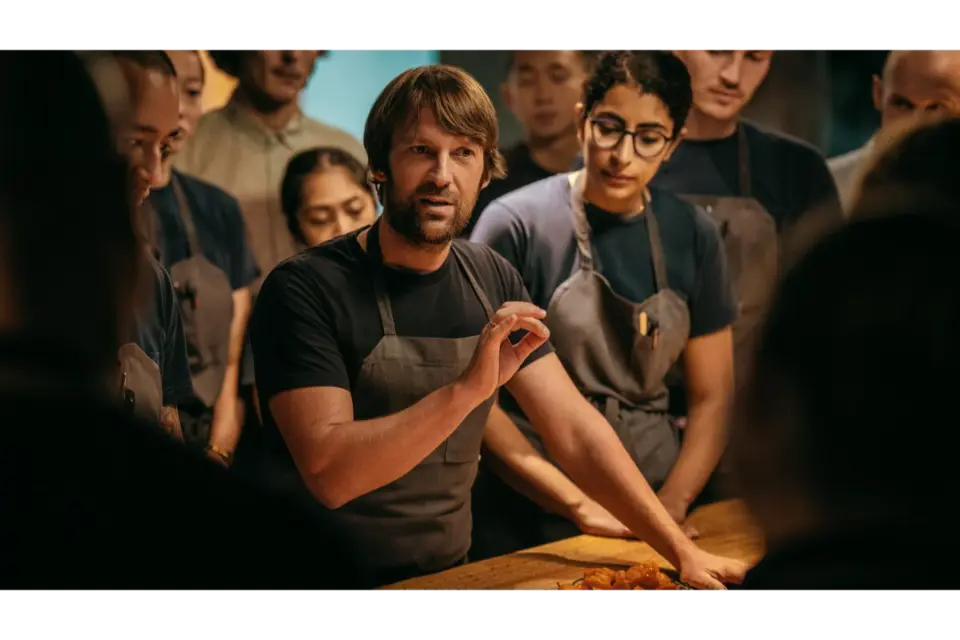
Conclusion Islifearecipe Omnivore Apple TV Review: A Must-Watch for Food Lovers
In a world saturated with food shows, Omnivore really stands out as something special for me. My head is still spinning with what I have heard, seen and learnt from the show. It’s not just about cooking, far from it, it’s about understanding the complex relationships between food, culture, history, the environment, and us.
With stunning visuals, beautiful storytelling, a caring Chef’s perspective and a thoughtful approach to food’s role in our world, Omnivore is a must-watch if you care about what you eat and the impact it has on the planet. Omnivore offers a feast for the eyes and mind. Apple TV has created a series that’s both beautiful to watch and stimulating, making it a standout in the world of food documentaries, and likely my favourite of all time. It is just WOW!!!
Thank you Apple TV+, I am totally broadsided and blown away by the show, and Chef Redzepi please do more TV, you were simply incredible my friend. Kudos!!! I just really hope you like our Omnivore Apple TV Review.
Omnivore Apple TV release date
Omnivore Apple TV release date was 19th July 2024, and as it is a mini-series back-to-back you can binge them all in one go. 360 minutes of glorious foodie TV.
Omnivore Apple TV Rotten Tomatoes Review
Omnivore Apple TV Rotten Tomatoes gave a stellar review with 100% Avg. Tomatometer and 71% Avg. Popcornmeter (see it’s corn AGAIN).
“Narrated by renowned chef René Redzepi, this global series explores the ingredients that built societies, shaped our beliefs and forever altered the human story. From salt flats in Peru to coffee forests in Rwanda to wild tuna off the coast of Spain, each episode celebrates the way we grow, transform and consume the world’s best resources — the ones we eat.”


